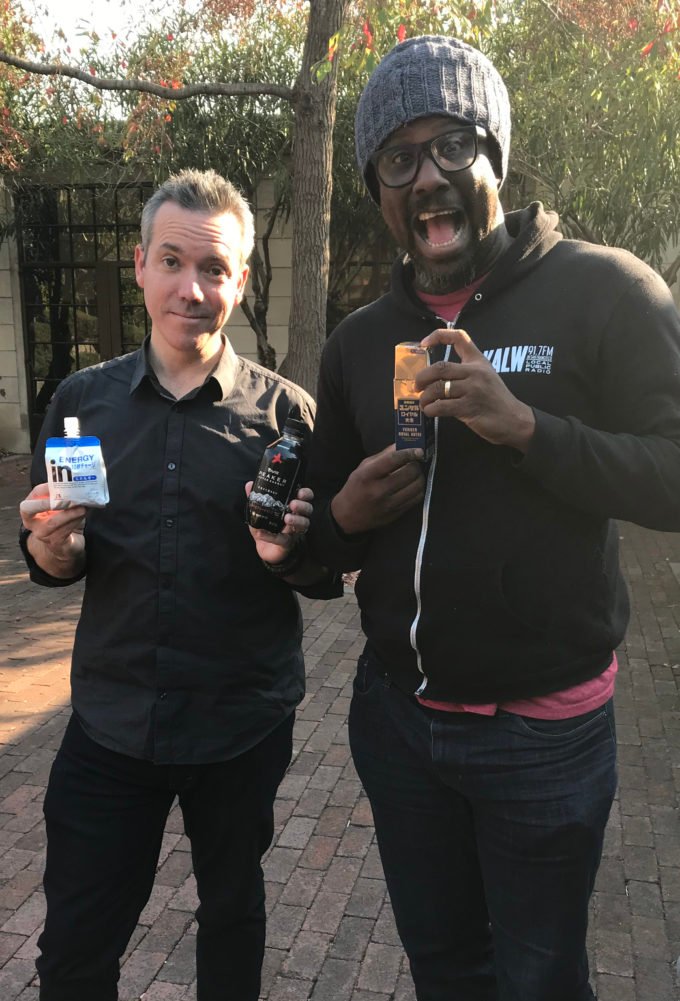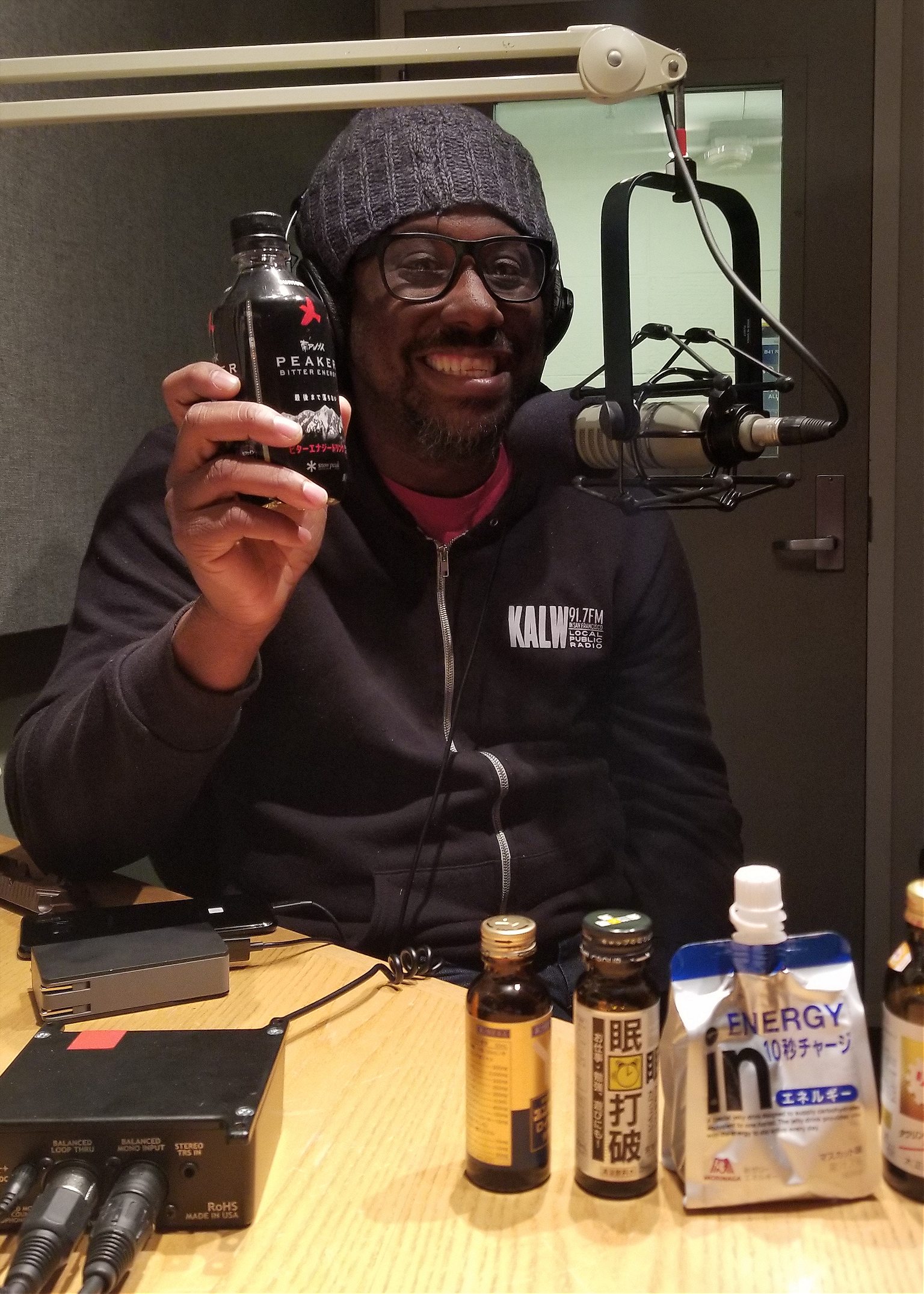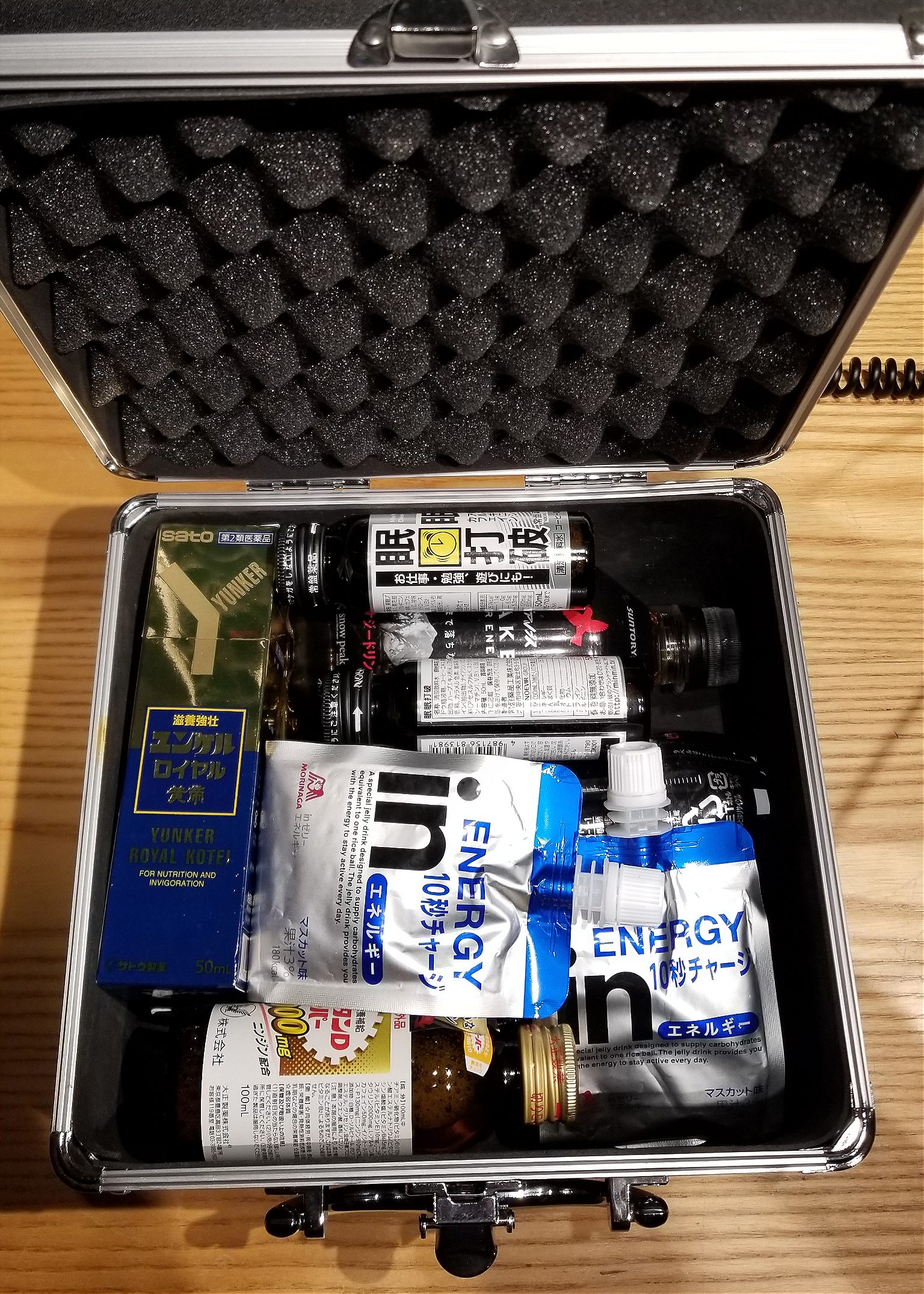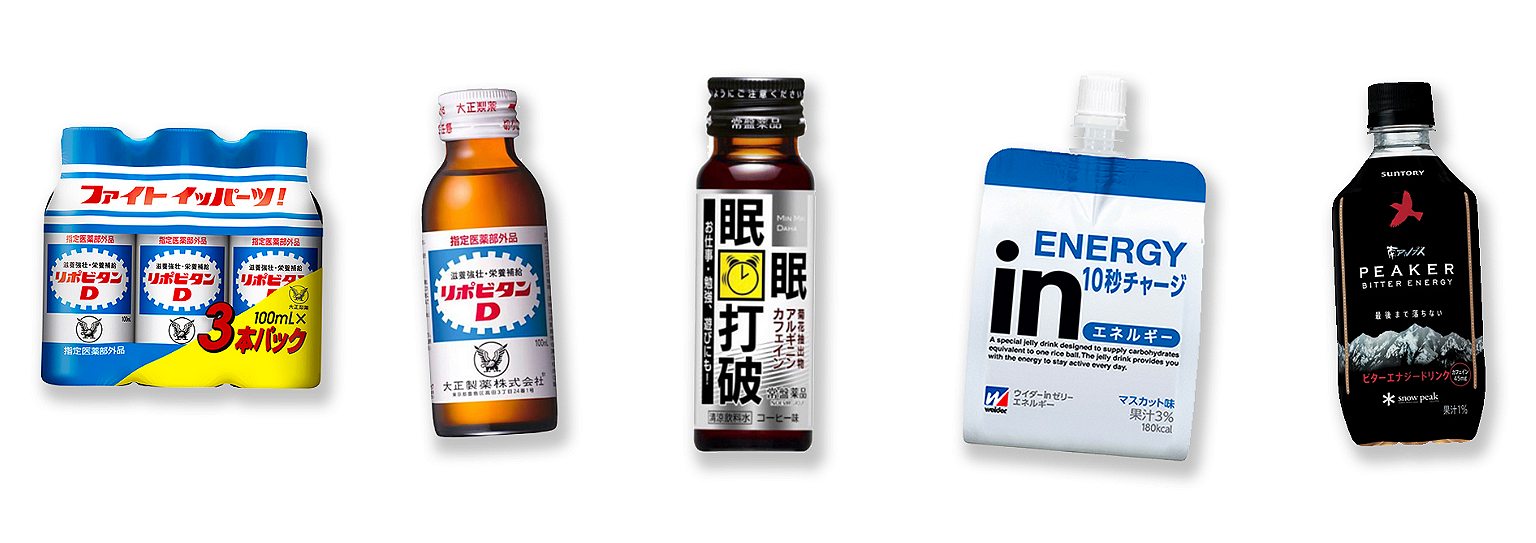
Japanese Energy Drinks with W. Kamau Bell

W. Kamau Bell, the host of CNN’s United Shades of America, talks about making television and handling fame, all while getting super amped on speed-laced Japanese beverages
W. Kamau Bell, the host of CNN’s United Shades of America, is on a mission to make television that is simultaneously important and entertaining. This week on The Trip: Drinking with Exceptional People Around the World, host Nathan Thornburgh sits down with Bell in Berkeley, California, where they attempt to survive a lineup of potent Japanese energy drinks while discussing the process of making television and handling fame.
Here is a condensed transcript of the transcript. You can listen to the full episode, for free, on Apple Podcasts, Stitcher, Spotify, or wherever you get your podcasts.
W. Kamau Bell: Can I have one of those waters? Is that the special water for later in the podcast?
Nathan Thornburgh: This is not a special water. This is just, this is just to stay alive water.
Bell: I know there are special things in there.
Thornburgh: Mini water bottles are probably a good idea because I have on the table in front of us a box of Japanese energy drinks that’s got enough Yaba in it to kill a water buffalo. We’re going to do a little tasting. We’re two days after the midterm election and this feels like a perfect time to have like just a bunch of different kinds of struggle juice.
Thornburgh: So, here’s what we got. Lipovitan-D, Energy 10, Peaker Bitter…
Bell: Oh, wow.
Thornburgh: I just got back from Japan two days ago and I think I had sensed it in previous trips, but we were out there filming and had an intense schedule and you realize at 4:30 in the morning and the convenience stores that Japan is actually a land of tweakers. The amount and variety of energy drink solutions that they have. It’s a Jiro, Jiro level dedication to the art of taurine.
Bell: Jiro Dreams of Sushi. Is that what that reference to that is? I love that film.
Thornburgh: Nicely done. Jiro dreams of methamphetamines.
Bell: Did you know I’m an energy drinker?
Thornburgh: This is what I know about you. Why are you an energy drink drinker?
Bell: A lot of times before I do this—and this has been true for years and it happens a lot of comedians—I would get sleepy before getting on stage. It’s like your body starts to like shut your energy levels down to prepare you to go on stage. So I think it started out as a way to give me, give me a jolt. I’m also part of the generation that that Red Bull was marketed to.
Thornburgh: Like you just saw dudes in wingsuits and were like, “let’s ride.” I mean, but what’s wrong with cocaine? I mean that’s how comics usually get over that hump.
Bell: I’m also old enough to be the Red Bull generation, but young enough to have watched all those movies about how cocaine didn’t work out very well. That cocaine comedy generation is really that 80s, maybe early 90s era when comedians were like rock stars.
Thornburgh: You guys went full indie again.
Bell: Yeah. It was full indie, and it was acoustic musicians in coffee shops, and bad spoken word poets. Not the good ones, the bad ones.
Thornburgh: Well, I look forward to raising a generation that’s going to be terrified of energy drinks after having seen the chaos that it can wreak on the body.
Bell: My current energy drink of choice is sugar-free Red Bull.
Thornburgh: Oh good. This is going to kick the shit out of that.
Bell: I have to tell you at this point I could drink a sugar-free Red Bull and go right to sleep. That’s how I know it’s a problem.
Thornburgh: It’s a maintenance high.
Bell: It’s a maintenance high, but I think there’s something about Red Bull that just felt like it didn’t want to kill me in the way that some of those other drinks felt like they wanted to.
Thornburgh: So, now that we’re properly juiced, we can talk about what we have in common, which is we both knew Anthony Bourdain. He was a fan of yours from the start. Had you been watching his show before you started your show at CNN?


Bell: Yeah, he was very much on my radar before that. I used to sit on the couch of my girlfriend—now wife—and watch his show on the Travel Channel, and I have specific memories of talking to Mike, her roommate at the time, saying man, wouldn’t it be great to have a show like that?
Thornburgh: This was before you were on television.
Bell: Way before, way before. I didn’t have anything going on. I didn’t have an agent, a manager.
Thornburgh: You were just a man yawning backstage with some sugar-free Red Bull.
Bell: I ended up getting a show, Totally Biased, but before that, I might as well been saying I would like to sprout wings and fly like they do in the Red Bull commercial.
I ended up having a meeting with CNN about a year or so after Bourdain went there. When he went to CNN, I, like a lot of people, was like how’s that gonna work? It’s funny because he knew that people were thinking that. He had the idea of, “we have to really go hard when we get to CNN so my fans don’t think I’ve softened up.”
Thornburgh: So, how did United Shades of America come about?
Bell: Totally Biased got canceled. Now there’s a lot of these shows, like a one-person take on the news of the week. At that point, when I got my show, it was John Stewart, Stephen Colbert, and Bill Maher.
Thornburgh: Right.
Bell: We’ve seen many shows come and go, but you’ve got Hasan Minhaj’s show on Netflix. So after Totally Biased got canceled, I was just out there taking general meetings because at this point I did have an agent and a manager.
Thornburgh: Right.
Bell: I had a meeting at CNN. I had one with Jeff Zucker.
Thornburgh: I heard he runs shit over there.
Related Reads
Bell: He runs shit over there. A lot of the meetings I was having were with news organizations or news websites. It was sort of funny to me that after Totally Biased, people thought, “oh we need some humor in here.”
So, that’s how I met with Jeff Zucker. And he’s like, I’m not going to do a late night show. And I was like, great. Because I’m not going to do a late-night show.
Thornburgh: Who said anything about a late-night show?
Bell: Yeah, yeah. So it was like what can you do? At that point, All3Media had pitched them a show. I keep telling Jimmy Fox, the guy who created the show, that I would stop telling this story, but this is a different situation. It was about a black comedian traveling around to white places in America. And it was going to be called “Black Man, White America.”
Thornburgh: And he wants to bury that name.
Bell: Now give Jimmy Fox credit. He did also come up with the name “United Shades of America,” so he knows how to come up with good names. But they didn’t have talent attached to the show, so CNN said maybe Kamau can do this.
Jimmy changed the names, United Shades of America, and then we started to figure out what the first episode would be. And Tony was always in my mind about that. I mean CNN had, at that point, Tony, Lisa Ling, Morgan Spurlock, and Mike Rowe. I was like we have to do something none of those shows could do or would do in the same way.
Thornburgh: Not to get super reductive about it, but there is one difference between you and them. They’re not comedians.
Bell: Oh…yes. That’s not what I thought you were going to say, but yeah. I think we had to go big or go home, but I also wanted to make sure that it didn’t look like we were just doing a version of Tony’s show or a version of Lisa’s with a different host.
Thornburgh: Nobody wants it. Nobody needs it. We’ve seen people calling out for it in different ways since Tony died and that sounds terrible. Like you can’t just throw a pair of cargo pants at some dude and say up next.
Bell: It’s funny to me how many people on Twitter, especially immediately after he died and especially after the episode aired of me and him in Kenya, have said they hope I get his show. I’m like, okay, I already have a show. I don’t know how that would work for me. It’s not like his show is the Tonight Show, where someone has to host. It’s Parts Unknown with Anthony Bourdain. His name is in the title. You know what I mean? No. What we need to do, and what Tony would want us to do, is find other people to do shows that are the shows they want to do.

Thornburgh: Right. So, you don’t have any announcement about Anthony Bourdain: Parts Unknown with W. Kamau Bell?
Bell: That’s right. I just thought it was so funny because I have a show and it doesn’t help CNN to move me to his show. The thing about my show is we’re still growing. We’re only four seasons in. I want to continue to grow the show. When I got back from filming in Kenya with Tony, I called Jimmy Fox and was like we need to change lots of things. I saw some things out there and I’ve learned some things.
Thornburgh: About the way you shoot…
Bell: The way we shoot and the way we handle the shoots. It’s very clear from being with Tony’s crew that they worked together a long time, so everybody had the freedom to do their job without somebody standing over their shoulder and saying, “don’t do that.” They also had the freedom to speak their minds.
Thornburgh: The thing that I think people also didn’t recognize was Tony had made that same show for 16 years with many of the same people. Mo Fallon was relatively new, and he’d been there for a decade. Also, Tony had his whole vibe when it came to filming.
Bell: It was set up so he could put his energy in the right place. He knew his energy and knew what he could do and couldn’t do. I like to connect with people, especially people who have never been on camera before we start shooting. The comic in me just wants to warm them up so you don’t have to be like, “um…. uh” on camera.
Thornburgh: But you also have another gig there because you are trying to convince them that this is not some Borat shit that’s going on.
Bell: A lot of the first season was like, I’m here to make fun out of this situation, not make fun of you. I want to make you laugh because you’ll be more relaxed, right? I’m not trying to make fun of you for the people at home. I mean, every now and again, it falls into that category but generally, my thing is let’s both have a good conversation. Part of a good conversation is laughter.
Thornburgh: You had talked about watching Tony before you started your show, and the thing is I really felt like he started to crib off of you and what you were trying to do when he went down to West Virginia.
Bell: Ah, that’s so funny. Oh wow.
Thornburgh: I mean think about it. That’s essentially what United Shades is about. I mean, I can’t tell you about your show better to hear from other people. Sometimes it’s just like getting yourself out of that comfort zone and like exploring some kind of micro-culture that has meaning there. That was not something he did a bunch. He got totally hooked in West Virginia.
Bell: For me, there’s got to be some sort of emotional, physical, psychological, political, intellectual jeopardy for me to feel like it’s actually worth doing because I don’t think I’m a good enough host to just pull it off on my smile.
Thornburgh: And that’s when you know you’re about to do something right.
Bell: That it’s worth filming and putting on television. It’s got to be something that pushes me emotionally. Sometimes you can be excited about this thing or so excited to talk to this person but generally, it can’t just be that.
Thornburgh: That’s interesting. I remember you did an interview with Ana Marie Cox, and you’ were talking about President Obama saying he’s not the president of black America, but like he knows that you know that he is the president of black America. Do you feel that way with your show?
Bell: Yeah, yeah. When I got Totally Biased, one of the producers—a man named Chris Rock, said, whether you like it or not, you just have to deal with the fact that because there’s not a lot of black people on TV, you are going to be looked at as someone who speaks for black people. I took that as sometimes I got to know when I’m making a statement that this is a statement for black people. If it’s not, I got to be real specific about that statement in a way that Bill Maher doesn’t have to think about.
Thornburgh: You really get to see the results of that in the show that he makes.
Bell: I have to be aware.
Thornburgh: So, I recently saw you at the Emmys. I saw you rock your kid at the Emmys.
Bell: Yeah, brother.
Thornburgh: I was very impressed. Kamau shows up with the Baby Bjorn and it had you had some stickers on it that said “Families…”
Bell: “Families belong together.” It actually wasn’t a Baby Bjorn. It was a Moby.
Thornburgh: I’m out of the game. My youngest child is 10, so I haven’t marsupial-ed a child in a while.
Bell: Shout out to the Moby company! We’ll take more. I was like, we need a thing I can put on the thing I was carrying the baby in. My assistant, Kelly, found this thing that said ‘Families belong together,’ and I rocked it with the ACLU ribbon. That was my third Emmys. Before my first Emmys, I never imagined going to the Emmys. I wasn’t thinking about awards. So when you get to the third one, and especially with everything that’s going on, it was like it has to be about more than just going to the Emmys.
Thornburgh: Right.
Bell: It sounds corny, but if there’s anything you can do to sort of create some more daylight, especially when you have a place of privilege like I do then you just have to figure a way to do it because otherwise it just feels like a missed opportunity. I love going to the Emmys, but I also know it’s not real. It’s got to be about something bigger.
I’m in a position that I never imagined I would be in. If I’m going to be here, I have to actually make this worthwhile in a way that doesn’t feel like thanks for the check, Showbiz, you know?
This conversation was edited and condensed. You can listen to the full episode, for free, on Apple Podcasts, Stitcher, Spotify, or wherever you get your podcasts.
Up Next
Tacos in Viking Country with Rosio Sanchez
Hammered Vegans with Shannon Martinez
One of Australia’s great chefs of vegan cuisine is an avowed meat-eater.
Sipping Through Austria
Writer, editor, and Vienna native Alexa van Sickle—shown here in Saint Petersburg with The Trip host Nathan Thornburgh—talks about her boozy road trip through Austria
Dreams of Pickled Heron in Galway
One of Ireland’s great chefs, JP McMahon, talks swan pie, pickled heron, and other delicious cruelties of yore.
Multi‑Frame: Q&A with Sarah Palmer
Photographer Sarah Palmer on her process, blending images at Trump rallies, and accessing Celine Dion without a press pass.






